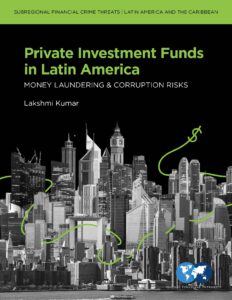December 22, 2022
WASHINGTON, D.C. – Over the last decades, the private investment fund sector has grown into a multi trillion-dollar industry. Private investment funds are vulnerable to money laundering because they contain a variety of structural risk factors that help camouflage illicit behavior. A 2020 leaked bulletin from the Federal Bureau of Investigation found that criminals were using “private placement funds including investments offered by private equity firms and hedge funds, to circumvent the anti-money laundering (AML) programs of other financial institutions and launder money.”
The new Global Financial Integrity (GFI) report Private Investment Funds in Latin America: Money Laundering and Corruption Risks examines the money laundering risk factors associated with these private investment funds in Latin America. It analyzes the ring of actors and facilitators involved, the methods of contact used by perpetrators and the channels utilized to move illicit money. The region’s geographic, economic, historic, and cultural proximity to the U.S. has meant that the U.S. and U.S. policies have always had an outsized impact on the politics and economies of the countries in the region.
A 2021 GFI report dubbed Acres of Money Laundering: Why the U.S. is a Kleptocrat’s Dream found that 54 percent of real estate money laundering cases were tied to illicit funds from the region. “In the popular imagination, the money laundering capitals of the world are small countries with histories of loose and secretive financial laws. But there’s a good argument that, right now, the best place to hide and launder ill-gotten gains is actually the United States,” said the U.S. Treasury Secretary in a statement in 2021.
The Private Investments Funds in Latin America report provides a series of case studies and analyzes AML regulation of private investment funds in four countries; Brazil, Mexico, Chile and Argentina. Brazil remains the LAC region’s largest private investment market. Data estimates from Preqin, and alternative assets database, reveal that around US$38 billion, or 44 percent, of total Latin America-based assets under management is concentrated in Brazil. From a money laundering standpoint, a particularly interesting trend that has emerged in the Brazilian private investment fund space is the share of family offices in overall investments.
Additionally, the report uses a series of case studies to highlight how money laundering, corruption and organized crime risks exist in private investment funds in Latin America. The risk factors include a customer base often composed of wealthy individuals, including politically-exposed persons; a close relationship between fund managers and their clients (i.e. investors); the use of shell companies and trusts to manage investments; outsourcing operations and risk management; weak transparency around source of wealth and source of funds; and investment structures which may include multiple accounts in different jurisdictions, including secrecy and tax havens, with funds moving through a concentration account.
GFI provides the following key recommendations:
- The Brazilian government, which has the largest assets under management in the region, should be the first to adopt AML regulations that will address future risks when they arise. As well as regulators pay closer attention to family office architecture and undertake a risk assessment of the sector.
- Latin American authorities should look to regulate intermediaries and enabler professions for AML/CFT due diligence as they are critical in allowing illicit money to move through the financial system within the region but also to be invested in private investment funds overseas.
- The United States, Switzerland, the Cayman Islands, Malta, and other countries within the EU should conduct a robust money laundering risk assessment of their private investment fund sectors.
- Latin American law enforcement authorities involved in corruption, drug trafficking, and organized crime investigations should be provided training on the complexities of private investment funds and the manner in which they can be used to hide illicit assets.
This report is part of a larger project by GFI that analyzes financial crimes in Latin America and the Caribbean. The project’s first report, Financial Crime in Latin America and the Caribbean: Understanding Country Challenges and Designing Effective Technical Solutions, covered financial crime trends throughout the hemisphere. It looked at illicit proceeds from corruption, drug trafficking, mineral trafficking, trafficking in persons, and smuggling of migrants. Continuing with this effort, this report is part of a four-section initiative to understand financial crime threats in the hemisphere.
Para leer el comunicado de prensa en español haga click acá.
Editor’s Note
About GFI: Global Financial Integrity is a Washington, D.C.-based think tank, producing high-caliber analyses of illicit financial flows, advising developing country governments on effective policy solutions and promoting pragmatic transparency measures in the financial system to promote global development and security.
Press Contact
Dennis Mathenge Kabia
Communications Associate- East and South Africa
@IllicitFlows


